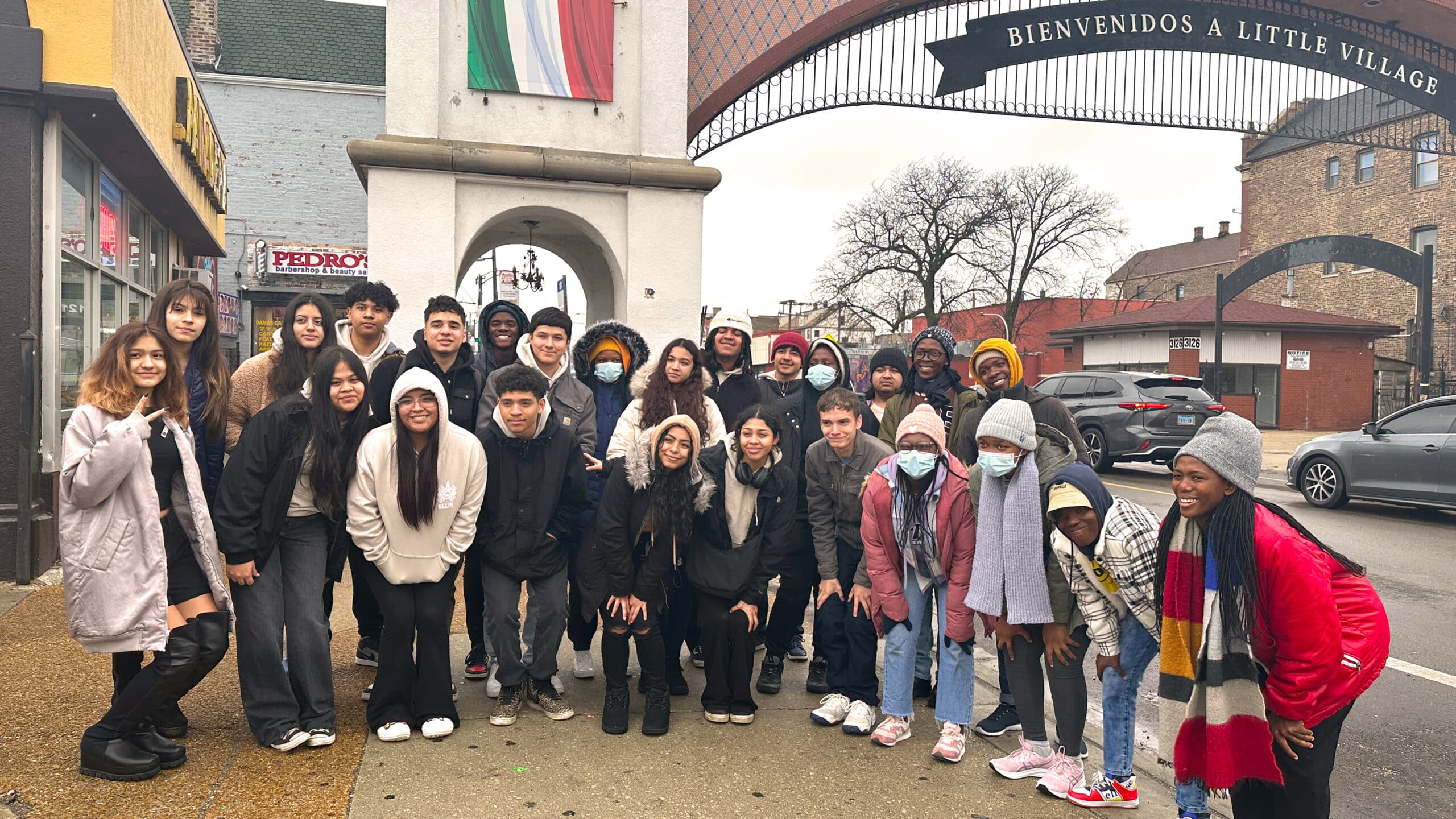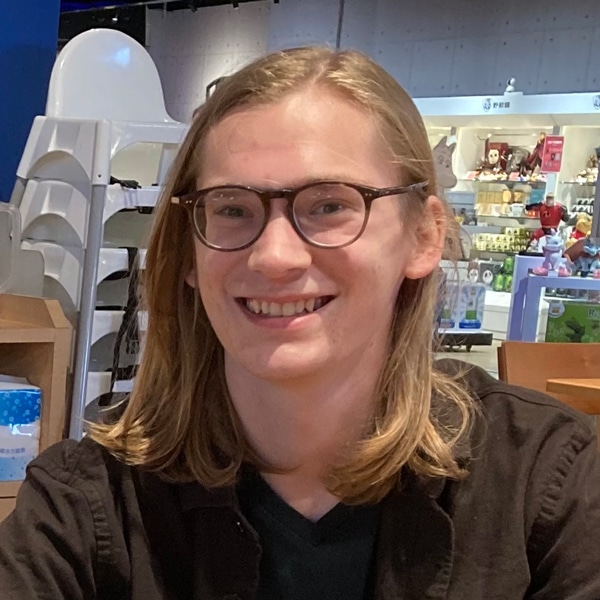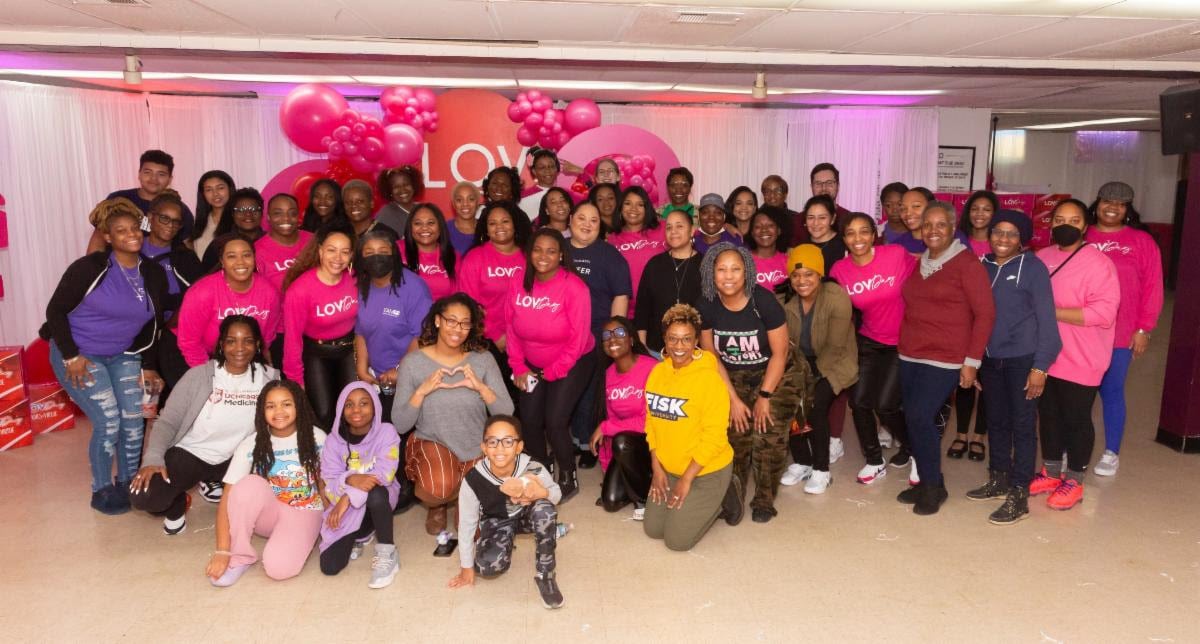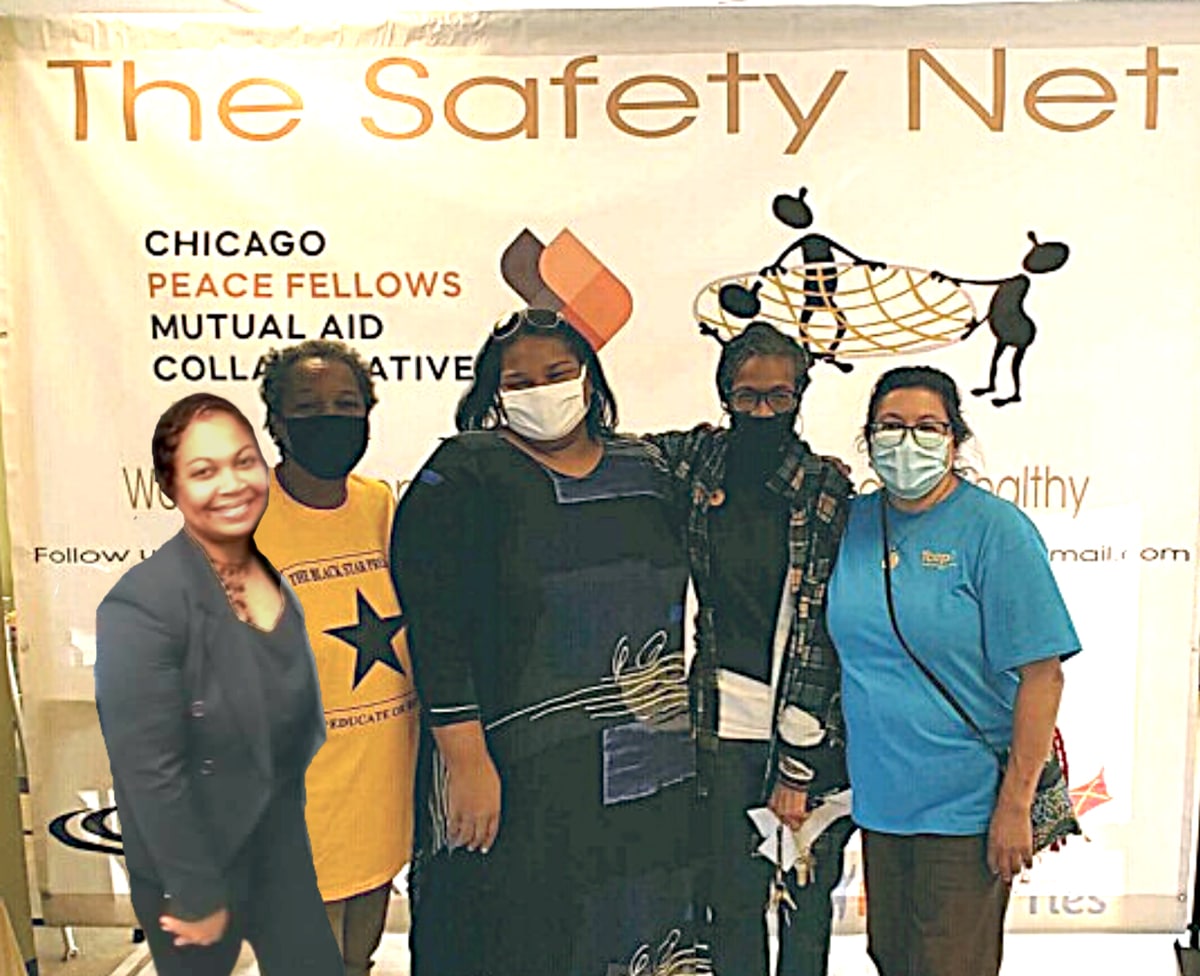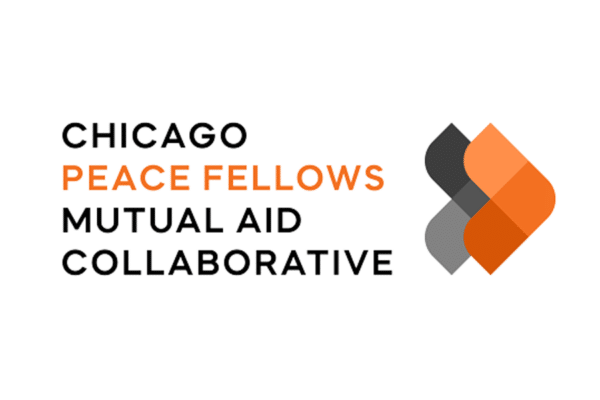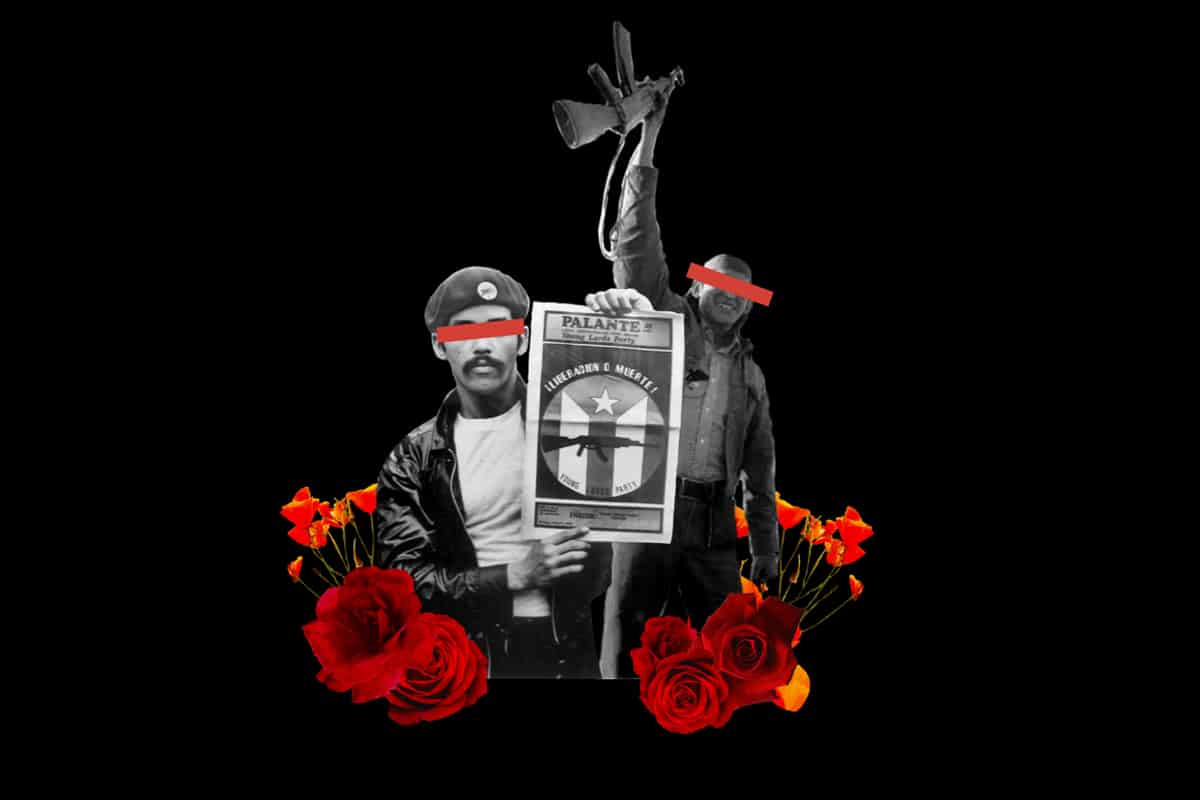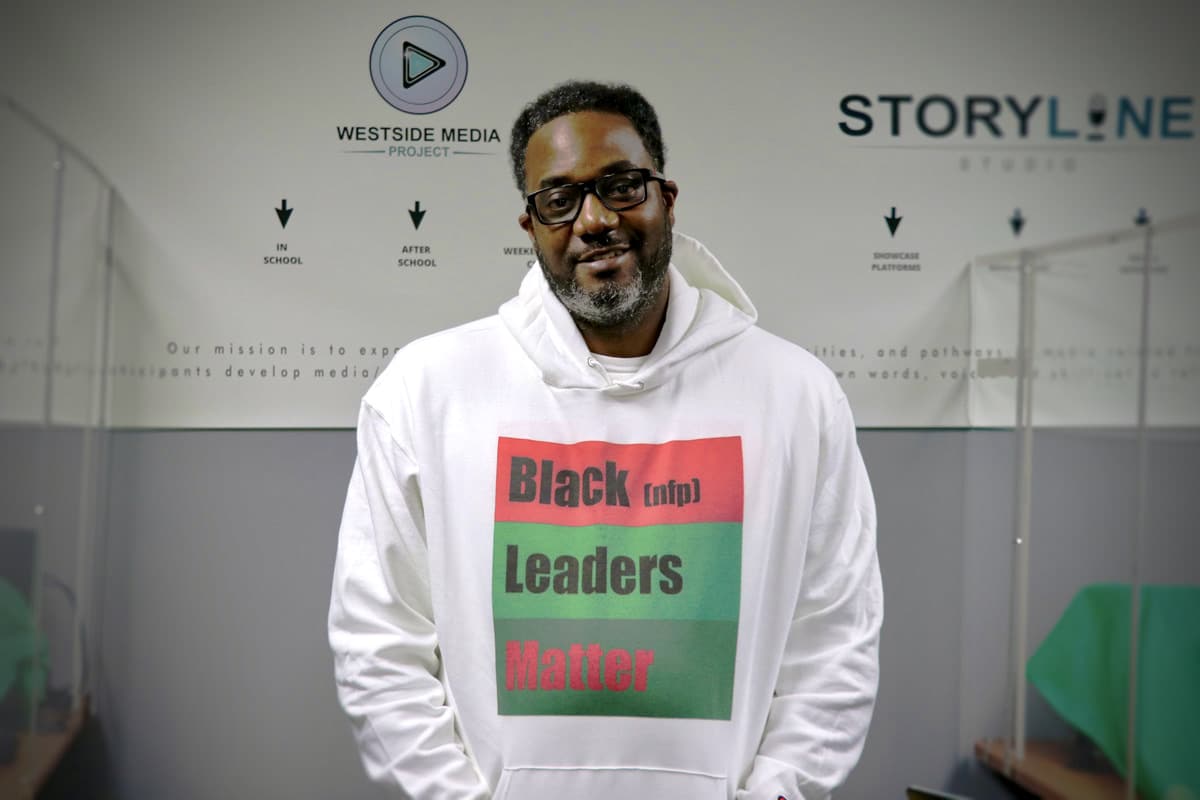Teaching the Importance of Pluralism and Social Inclusion through Robotics
By: Zeki Salah, Communications Associate
A global grassroots robotics initiative, One Team Two Continents, brought thirteen South African students to Chicago in March to participate in a FIRST robotics competition. The project was a joint collaboration between 2019 Chicago Peace Fellow Jackie Moore and 2018 Global Fellow Dieudonne Anumbosi Allo. Funding from the Chicago Peace Fellows Mutual Aid Collaborative and the U.S. Embassy in South Africa enabled the team to provide cultural programming and transportation for the South African students as well as their Chicago robotics team mates.
The Mutual Aid Collaborative consists of 74 Black and Brown leaders and committed allies who live and work in the communities they serve on the South and West sides. They have raised over $100,000 to support several active projects. As an expression of solidarity and support, The Funders Pledge, a project of the Mutual Aid Collaborative, decided to share their funding with the One Team Two Continents team to help cover the local costs of hosting the students.
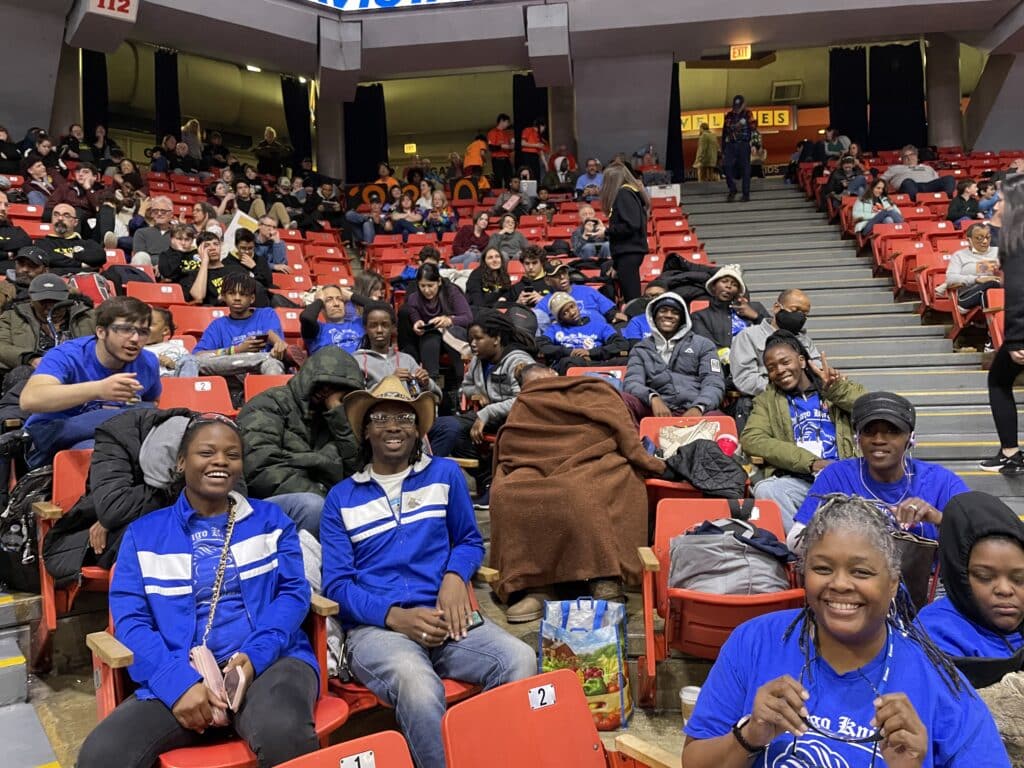
Both Jackie and Dieudonne have experience working with youth in STEM education, making them strong collaborative partners. Dieudonne is the CEO of the Global Leading Light Initiative, a non-profit in South Africa which supports young people in historically disadvantaged communities to acquire future proof skills, with the aim of reducing poverty and inequalities. Jackie is the founder and Executive Director of Agape Werks, Inc, a community based non-profit in Chicago with a mission to promote in young people an appreciation of math, science, technology, and engineering as strategic tools for success regardless of life circumstances.
The partnership between the students in Chicago and Port Alfred dates back to 2019, when Allo and Moore developed the “One Team Two Continents” concept after meeting through the Goldin Global Fellows program to explore cross-continental collaboration opportunities. This initiative envisions a youth-led, distributed team working together on robotics projects in an environment that fosters inclusion and cultural pluralism. The students from both continents convened under the banner of the Chicago Knights, a community based, borderless, and inclusive all-city FIRST Robotics team.
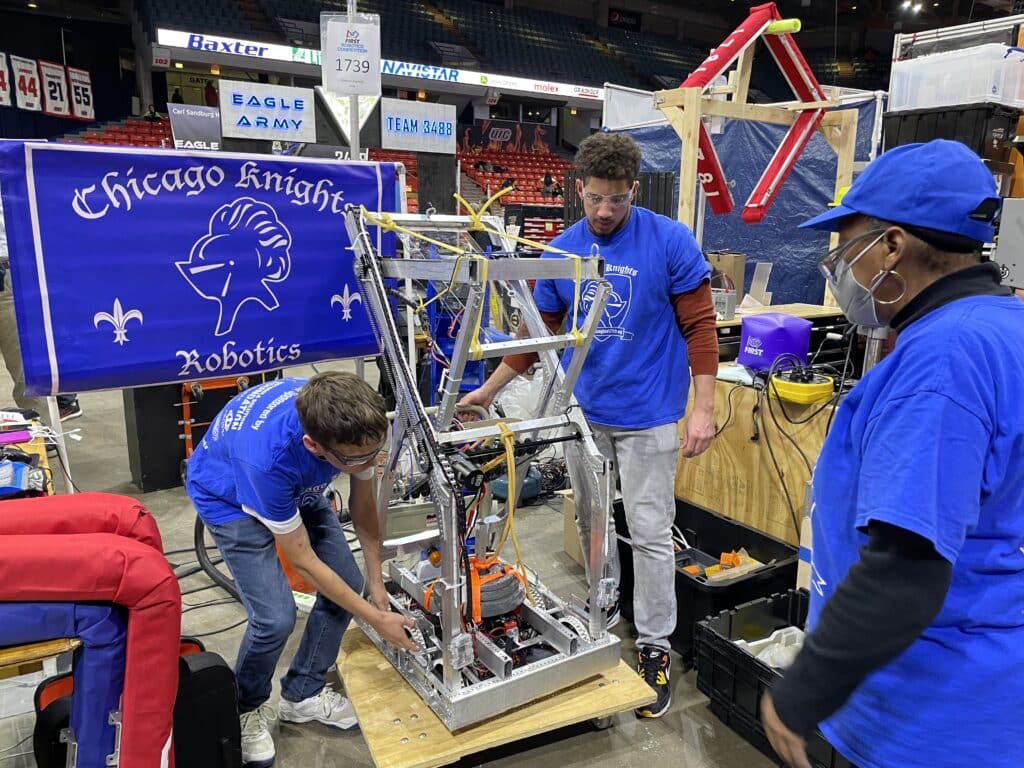
Prior to collaborating with Dieudonne, Jackie had been invited a few times to teach robotics in Uganda and South Africa. These opportunities did not meet her philosophy of teaching, which is to “not to become the expert in the room, but to work collaboratively with someone.”
Soon after Jackie and Dieudonne met, the pandemic hit and remote learning opportunities allowed for the students from South Africa to be involved in collaborative robotics programs. They collaborated remotely for an entire season of robotics competitions. Remote work did have its challenges, Jackie explains, “the way that I typically work really requires a lot of hand-on teaching.” While the virtual environment made it difficult for students to focus, especially in Port Alfred where they often faced the challenge of unstable internet connections and recurring “load shedding”, the students held on and kept coming back for robotics opportunities.
Things changed for the One Team Two Continents team when a grant from the U.S. Embassy's U.S. Mission to South Africa provided funding for students to travel between Chicago and Port Alfred. When applying for the grant, Jackie and Diedonne focused strongly on the fact that the kids from South Africa and Chicago would be working together as one team. Their project proposed to demonstrate the value of pluralism and social inclusion in a robotics environment. This allowed for the teens’ interest in robotics to be placed front and center while showing the value of pluralism and social inclusion through working together as a team.
The exchange between the students in Chicago and the students in Port Alfred went both ways, with the Chicago students having an opportunity to visit South Africa in October of 2022. Together the teammates built small robots and did exercises to develop capacity for working cohesively as a team.
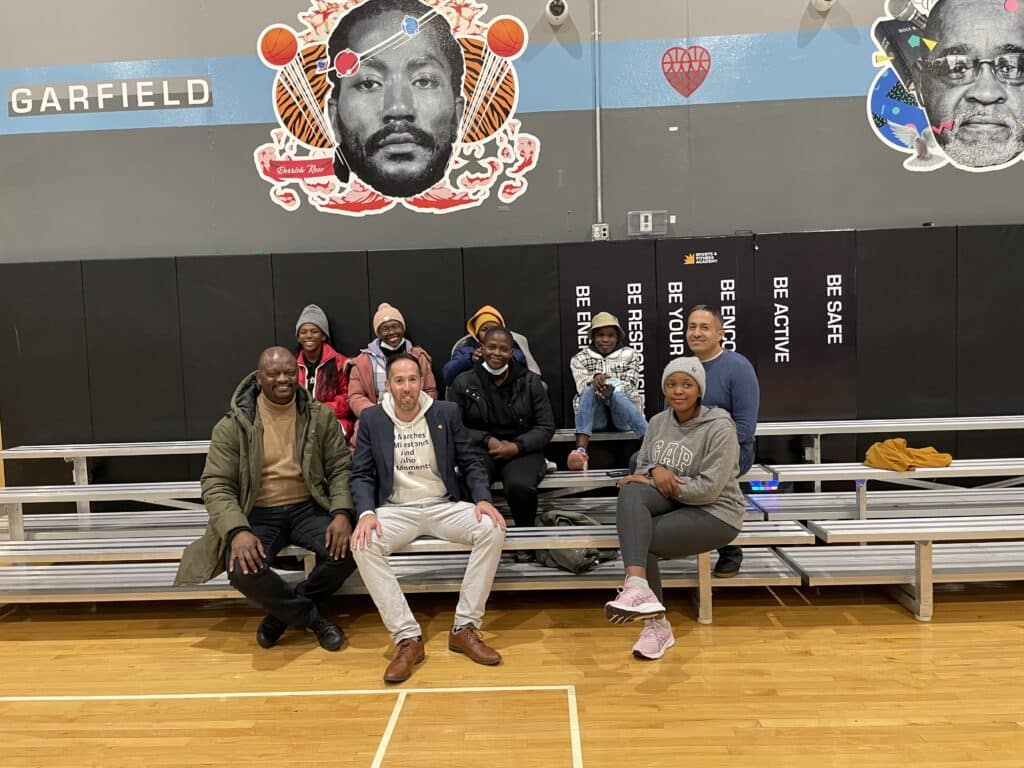
In one meaningful team building exercise, students were able to explore principles and practices of successful collaboration through a soccer game where the rules were altered to reflect the FIRST ecosystem’s values of “coopertition” and “gracious professionalism.” “Coopertition” is the practice of competing cooperatively in which a person will help their competition because the better they both are, the more they can do. In the same vein of competitive compassion,“gracious professionalism” is the idea of competing to the best of one’s ability, but to do it with grace and kindness. These two values harmonize well with Jackie and Dieudonne’s goals of pluralism and social inclusion because they encourage each member of the team to assess one another compassionately so that they can cooperate and work to each members’ strengths.
When the South African teens visited, they were taken on cultural tours of Chicago. These tours included all members of the team and many Chicago members visited places they had never visited. Students went to Little Village, Chinatown, and Robert Lindblom Math & Science Academy in West Englewood. Many of the South African students were surprised to see English as a secondary language in these neighborhoods, with the majority of signs being in Spanish in Little Village or Chinese in Chinatown. This encounter was particularly shocking to the adult South African on the trip who experienced apartheid, when assimilation to a dominant culture was expected. To see distinct Hispanic and Chinese cultural identities existing within a diverse society, and being celebrated by the community as a whole, was a new perspective and an example of the successes of cultural pluralism.
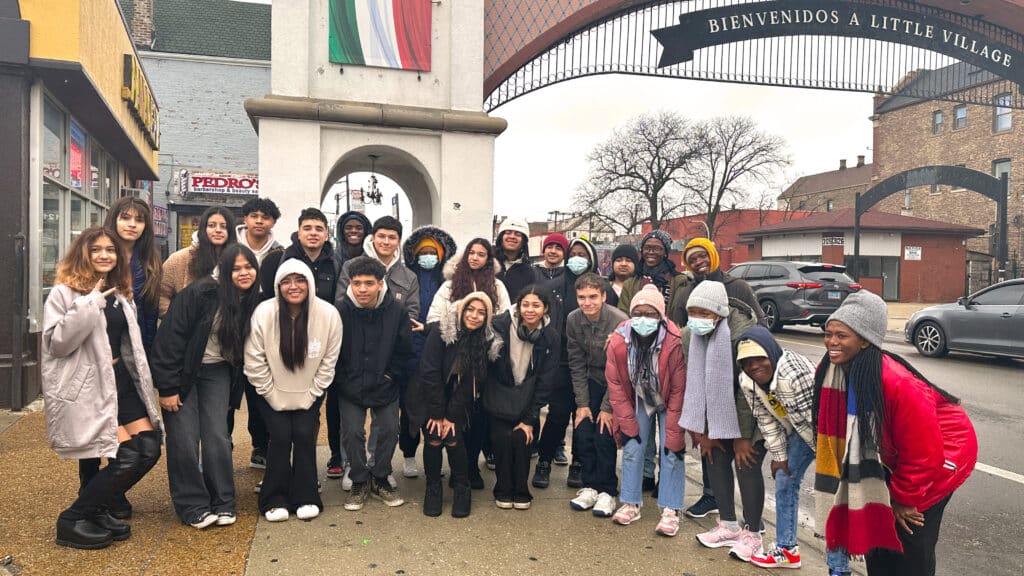
The teens who made up the Chicago Knights were incredibly dedicated to their team’s success, not only traveling internationally to learn robotics, but also sacrificing time from school and extracurriculars. The Chicago students missed Thursday and Friday for the competition, and a week of school to travel to South Africa in October. Hannah was a Chicago student who was new to the team this year. She was not able to travel to South Africa, but she worked consistently before and after the South African team arrived. For the competition, she took a break from her extracurricular activity of playing squash, missing a tournament to meet for robotics. This dedication to robotics helped the team members form close bonds and collaborate with one another and appreciate the diversity of the team.
The rules and guidelines for the FIRST Robotics competition came out in January, giving the team little time to build their robot in preparation. The 2022-2023 season of FIRST competitions was themed FIRST ENERGIZE, with activities encouraging the FIRST community to think about future energy sustainability. This challenge was inspired by the United Nations’ 7th Sustainable Development Goal, which is to ensure access to affordable, reliable, sustainable, and modern energy for all. The team built a mobile robot that was designed to play a custom game designed by FIRST. The robot uses a six-wheeled tank drive and is controlled remotely by a micro-controller called a roboRIO. It has an arm with a manipulator at the end which is composed of rollers that allow it to pick up and launch objects. The students built the entirety of the robot: interpreting drawings, measuring, cutting, drilling, and wiring electronics.
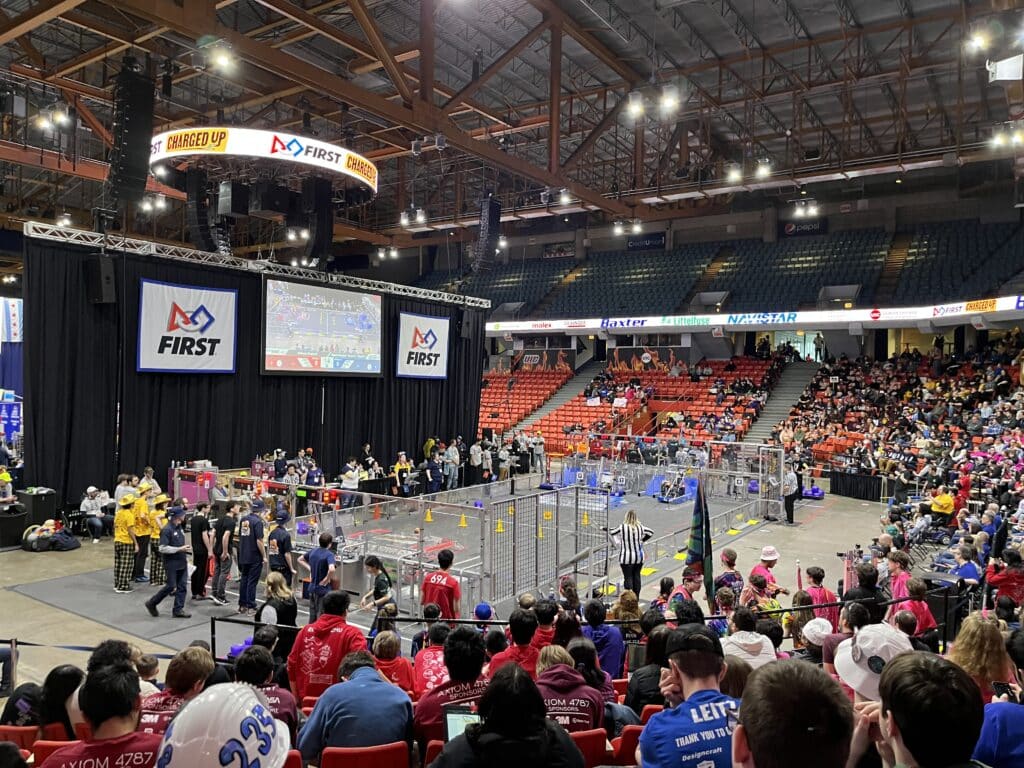
On the field were safety cones and inflatable spheres which needed to be gathered by the robots and moved to appropriate environments. Extra points could be achieved through creating links of particular objects within specific locations or by balancing the robot on an elevated platform with its teammates. Jackie and the Knights understood the game from a social perspective, referring to the manipulated objects as “cone people” and "square people” who could thrive by being placed together in diverse environments as a community which produces points as resources.
The team made an “Every-bot” design shared by the FIRST community which was designed to be accessible and constructible with basic tools. By focusing on the build, the team had a chance to get a lot of hands-on experience building by constructing the entirety of the robot in Chicago. The Chicago side of the team built an initial section of the robot, but when the South African students arrived they got to be a big part of finalizing the robot. Students learned skills and information on the sport to accomplish last-minute aspects of the build in the midst of the competition. One South African student named Litha came in without a great deal of hands-on experience but became a key member of the team working on electronics. She learned from mentors on the Knights and on other teams competing to gain the necessary skills to work on the electronics of the robot. Chicago students also stepped in to teach the South Africans what they had learned from prior builds. Reflecting on the process, Jackie noted, “I guess adversity builds strong bonds. We knew we had a deadline to meet, a very finite time to work on it, and they all worked together.”
Due to the timing of the South Africans arrivals and logistical challenges on the Chicago side, much of the building of the robot took place during the start of the competition. This came at the cost of missing the first day of competing, but provided bonding experiences and a lot of opportunities for the South African team members to gain the hand on building experience that they had been lacking. One student named Jalen, reflected on the building process: “We worked really hard. We would work from 9am-8pm because we had to build a whole robot in a week. We had to work quickly, make as few mistakes as we could, and stay focused.” Despite the rushed building process, the teens were very excited to participate in the competition and all came together to cheer when their robot made it to the competition floor.
As the teens on the Chicago Knights competed in the FIRST competition, they realized that cooperation was an essential part of the tournament. Many Chicago students went out of their way to teach South African students, who had limited experience building. For instance, Jalen was referred to as the “rivet master” for teaching the rest of the students how to use a rivet gun. Not only did teammates assist each other, but they were also helped by other teams. As the Knights crunched to build their robot, they were assisted by students from Lindblom to machine a ventilation pipe. Reflecting on her favorite memories working on the project, one student named Hannah reflected, “Cheering for our team at the competition was my favorite part. But we also got to go around and take pictures with other teams [...] I was shy to speak to other teams, but they were really nice and let me take pictures with them and their robots.” From start to finish, the FIRST competition was as much about compassion and collaboration as it was about competition, making it an excellent environment for cultural and intellectual exchange.
LOV Day 2023 Instills Purpose, Passion, and Perseverance
By: Zeki Salah, Communications Associate
On Saturday, February 11th, 400 self-care boxes were distributed to 400 girls across the neighborhoods of Bronzeville, Englewood, North Lawndale, and Austin areas. The boxes were distributed by Ladies of Virtue as part of their 3rd annual celebration of LOV Day. LOV Day was sponsored by the Chicago Peace Fellows Mutual Aid Collaborative as a partnership between 2019 Chicago Peace Fellows, Jamila Trimuel, Executive Director of Ladies of Virtue, and Dawn Hodges, Executive Director of Imani Community Development Corporation. Ladies of Virtue is a Chicago-based non-profit founded by Jamila in 2011 with the goal of becoming the premier mentoring and leadership training organization for Black girls in the world. LOV Day was established in 2021 to further their mission “to instill purpose, passion, and perseverance in girls, ages 9 to 18, while preparing them for college, careers and to become change agents in their communities."
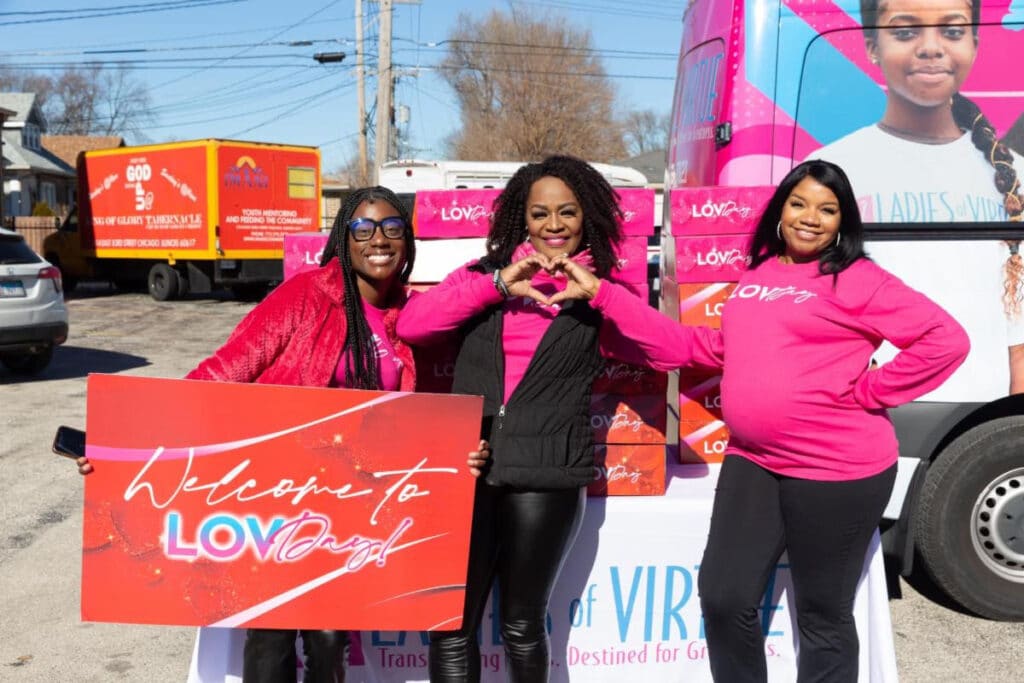
Ladies of Virtue is a mentoring and leadership program for girls, ages 9 to 18. Over the last 11 years they have served over 2,000 girls and families. LOV matches their participants with mentors and prepares them for leadership through our culturally relevant character building, career readiness and civic engagement curriculum. The team at Ladies of Virtue provides project management, collaboration and communication training via their two to four-month project experiences to empower girls to lead in the modern workforce. After graduating from high school, with successful completion of LOV’s leadership program, participants are mentored and supported for six additional years, from 18 to 24, as LOV 4 Life alumni.
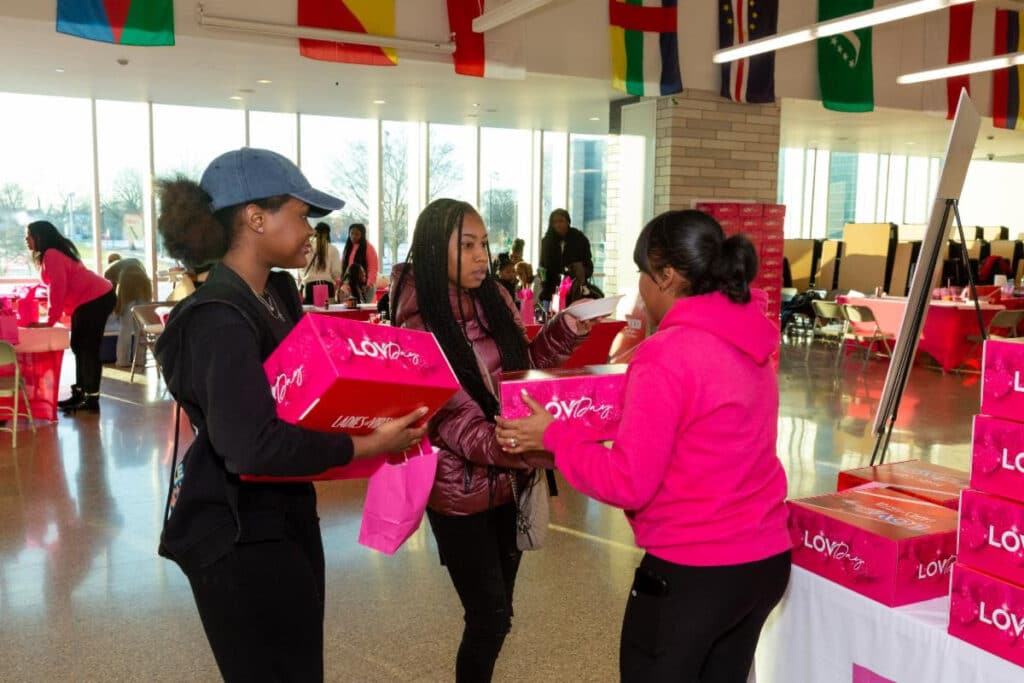
LOV Day was a community effort, obtaining funding from the Peace Fellows Mutual Aid Collaborative, drawing in fifty-five volunteers from 12 Corporate/Community Partners, and hosting events in six different schools and community centers. Jamila brought the proposal to fund LOV Day to the Mutual Aid Collaborative alongside 2019 Peace Fellow, Dawn Hodges.
The Mutual Aid Collaborative consists of 74 Black and Brown leaders and committed allies who live and work in the communities they serve on the South and West sides. They have raised over $100,000 to support several active projects. The Mutual Aid Collaborative met and collaboratively voted in January to provide LOV Day with funding to support the distribution of LOV Boxes filled with self-care items. Each LOV box included a teddy bear, chocolates and candy, a painting kit, hair care products, and Black history facts.
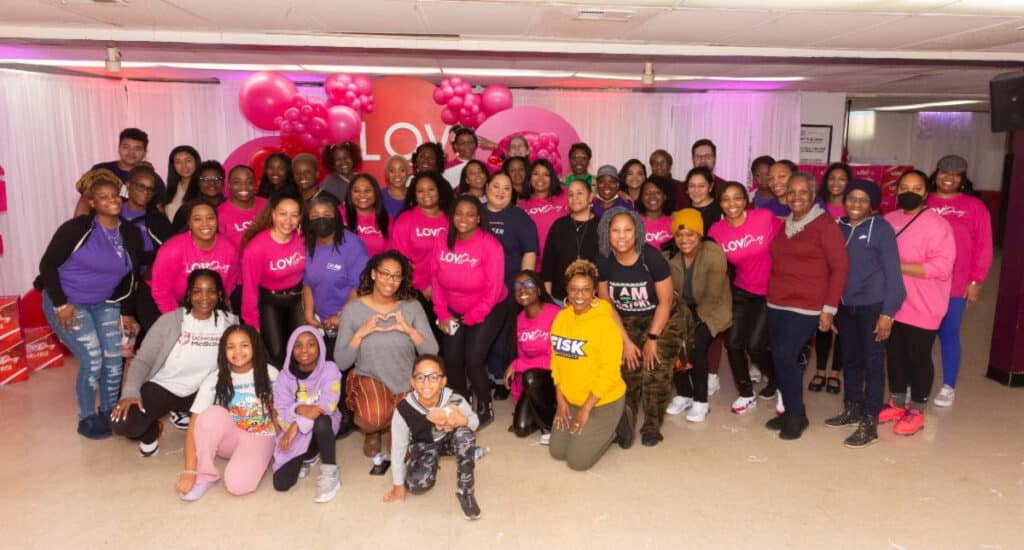
LOV Day served as a way to celebrate both Black History Month and Valentine's Day. Themes of Black history and culture were interwoven with the idea of providing girls with the space and opportunity to rest and care for themselves. LOV Day featured a self-care experience called “Black Girls Rest”. This event served 100 girls, twice as many as the previous year. Black Girls Rest included workshops on how to maintain healthy hair, skin care, and feminine care. Hair care stylists, cosmetologists, aestheticians, and an OBGYN all attended to provide guidance. Speaking to the themes of Black history and rest, one Lady of Virtue stated, ”All throughout Black history, slavery and during the Great Migration, Black people were constantly on the move and still to this day heavily dipped in GRIND culture. We need to STOP and REST.”
While 2022’s LOV Day centered more around the distribution of boxes, this year’s LOV Day focused heavily on programming, with Ladies of Virtue visiting six schools to hold self esteem and confidence workshops. Events include hair and makeup demonstrations, pillow decorating, mental health workshops, feminine and skin care tips, and candle making. The programs were conducted by program facilitators for the Ladies of Virtue and aimed to show Black Girls that they are and should be loved, nurtured, and protected. For instance, one workshop had girls identify what they love about themselves and encouraged their peers to support that expression of self-love.
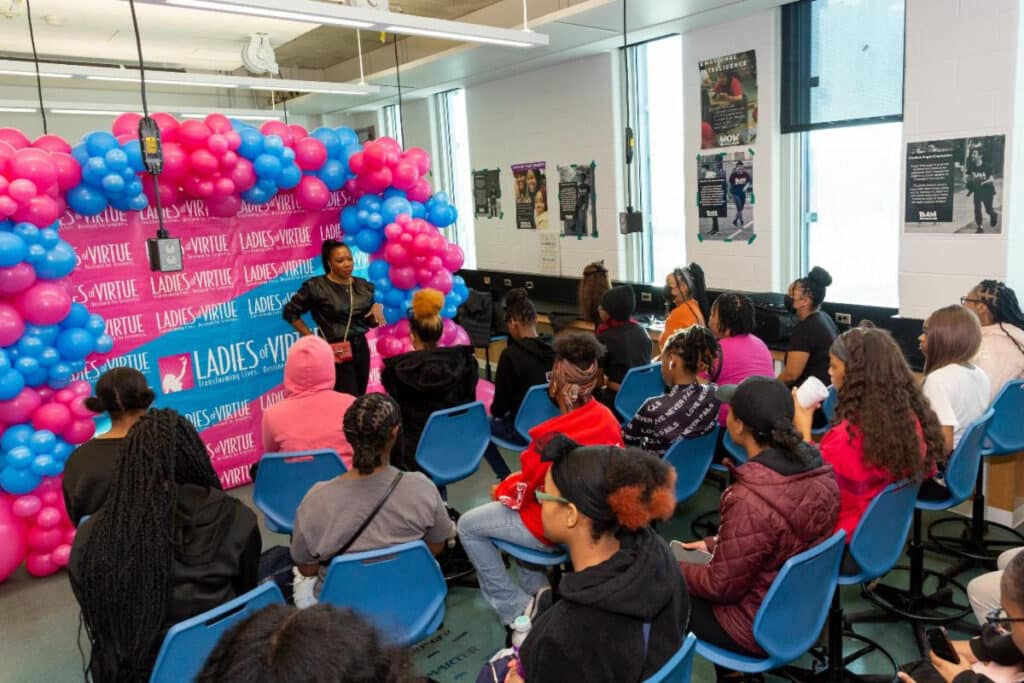
Jamila attended one of the LOV Day classes where girls were discussing when they were at their best. One girl that Jamila was working with said “Oh I love my smell because it reminds me of how my dad smells,” but then noted “ I really don’t talk about my dad much.” When Jamila asked why, the girl mentioned that he died a few weeks ago. Jamila reflected, “that really let me know that she felt like this was a safe space for her to express herself; that we were establishing a safe space for girls to just be themselves.”
To continue their mission of instilling purpose, passion, and perseverance in girls, ages 9 to 18, while preparing them for college, careers and to become change agents in their communities, Ladies of Virtues is always looking for volunteers. Volunteers serve as role models for their girls, parents, and the community. You can find volunteering opportunities for LOV at: https://www.lovchicago.org/volunteer
A December To Remember: Mutual Aid Collaborative Organizes a Toy Drive
By Michael Henderson, Director, Mutual Aid Collaborative
Juliet Jones, a 2021 Chicago Peace Fellow Alumni and the Co-Founder and Director of The Original Sixty Fourth Street Drummers, Inc. “wanted to bring children back to play” due to the set back and effects COVID-19 had on kids during the holidays. She thought holding a toy drive to benefit children in under-served communities would be a good way of accomplishing this goal.
Juliet, passionate about making a difference for children, proposed The Universal Toy Drive to the Chicago Peace Fellows Mutual Aid Collaborative. The Mutual Aid Collaborative consists of 60 Black and Brown leaders and committed allies who live and work in the communities they serve on the South and West sides. They have raised over $100,000 to support several active projects, including The Universal Toy Drive.
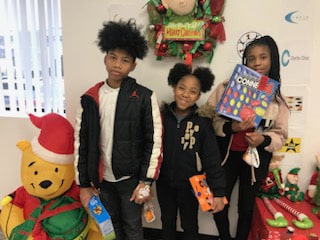
Juliet organized the Universal Toy Drive along with Dr. White, the TEECH Foundation, Clarity Clinic and Bethany Union Church to bring toys to disadvantaged children on the Southside of Chicago. Members from The Mutual Aid Collaborative, including Cosette Nazon-Wilburn of the LUV Institute, Jamila Trimuel of Ladies of Virtue, Gloria Smith of the Black Star Project, and Margaret Murphy-Webb of the Southside Jazz Coalition, all came together as a community to support Juliet. These leaders organized quickly by sharing flyers, sending and processing invitations, and reaching out to their network of parents.
On December 21, 2022, the Universal Toy Drive became a safe space for 113 children to play and receive gifts. The Universal Toy Drive was more than just giving toys away. Juliet knew the children who would be at the toy drive “normally missed out on a lot of things, not just toys, toys were the medium.” It was the intent of Juliet and the Mutual Aid Collaborative to bring joy to the lives of the under-served children and provide them with an opportunity to be kids.
Juliet was overwhelmed with joy as she got an opportunity to witness a village of children from a variety of places. Families who are dealing with HIV, children from the foster care system, children whose parents are incarcerated or in recovery, and other children from the community received all sorts of different toys, gift cards, coats, and other bags of goodies.
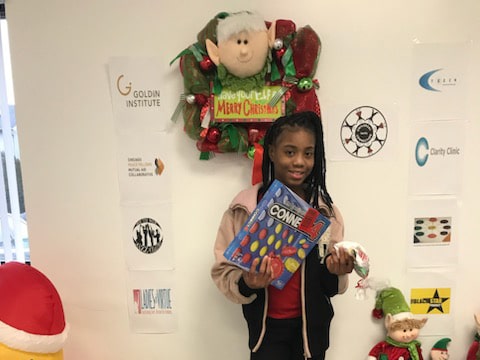
The 113 guests with their families that attended The Universal Toy Drive played board and video games, watched YouTube videos, played hopscotch and jump rope. They drank apple cider, hot chocolate, ate cookies and took pictures with Santa. The energy in the room was so amazing and filled with joy that the children received their gifts but, “didn't leave, they stayed and played, it was great”.
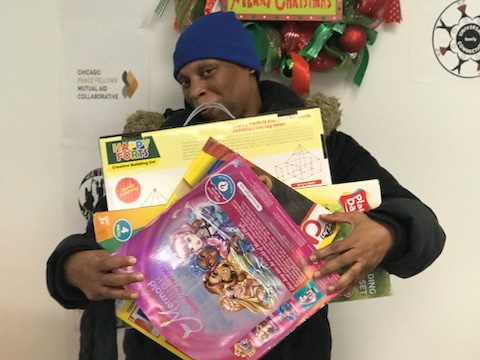
The collaborative efforts to touch the lives of children went beyond the imagination of Juliet’s and the village of local leaders. The Universal Toy Drive was a great success, providing 113 children with toys and gifting additional toys to The Universal Family Connection to use in their playroom for foster children. Juliet is ready for 2023 and has plans to continue to collaborate and organize with other community organizations to hold another Universal Toy Drive.
Mutual Aid Collaborative Launches Safe Cycling Project
By Zeki Salah, Mutual Aid Collaborative Facilitator
On April 14 at 6:15 am, Juliet Jones received a call from her son and was surprised to hear a police officer on the other end of the line. He asked if she knew a man named Julien Jones. When she replied that Julien was her son, the officer notified her that he had been hit by a car while riding a bike to work and was on his way to the emergency room.
Julien resided in North Chicago and did not have an affordable way to get to work, leading him to use a bicycle and become seriously injured in his accident. When Juliet first saw Julien after his accident, he was bruised, unconscious, and required a cranial operation. She nearly fainted after hearing the news. Julien was in the hospital for three weeks, from April 19 - May 2. Then from May 2 – May 23, 2022, Julien received inpatient therapy at the Shirley Ryan Ability Lab. He is out of the hospital now but sustained a traumatic brain injury.
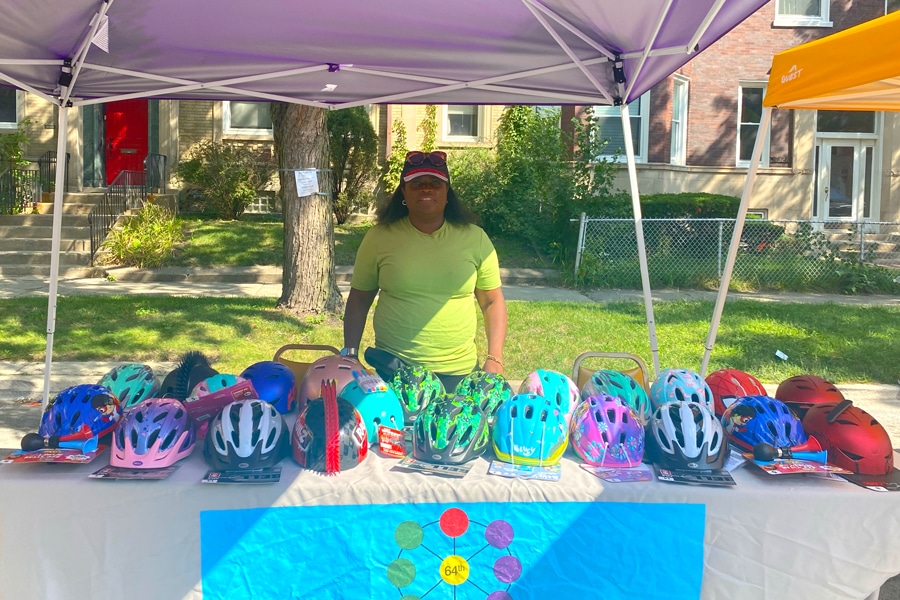
Juliet, a 2021 Chicago Peace Fellow, reflected on the accident that affected her son and wondered what would have happened if Julien had worn a helmet. The thought of averting similar tragedies motivated her to launch a Safe Cycling project through the Chicago Peace Fellows Mutual Aid Collaborative. Regarding her decision to begin the project, Juliet stated:
Violence is violence. A traffic accident or bike accident are not the same as gun violence, but those accidents are violent and traumatic and I want to do something about that.
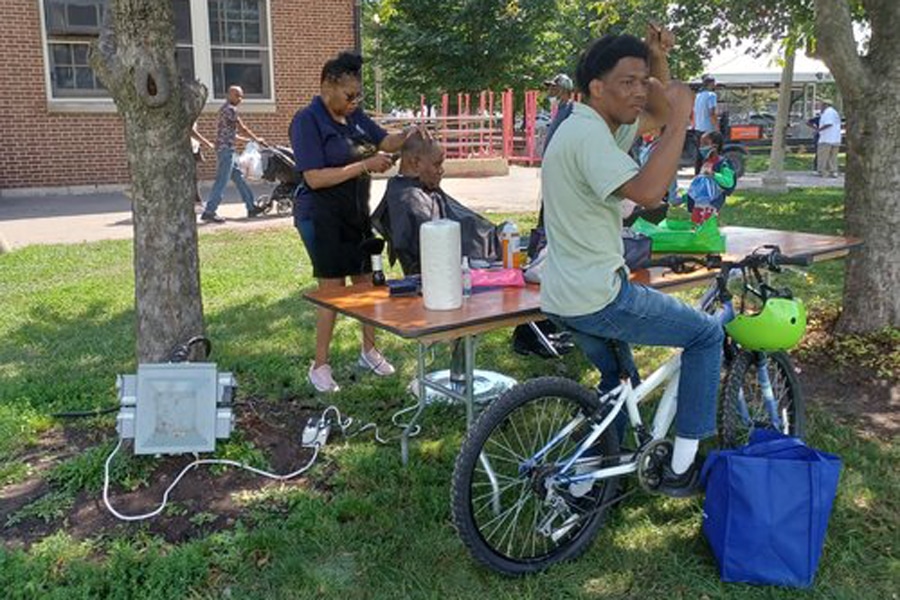
Juliet and her organization, the Original Sixty Fourth Street Beach Drummers, Inc., are now working with the Mutual Aid Collaborative to distribute helmets throughout Chicago. The Mutual Aid Collaborative consists of 60 Black and Brown leaders and committed allies who live and work in the communities they serve on the South and West sides. They have raised over $100,000 to support several active projects, including the Safe Cycling project. The Mutual Aid Collaborative met and collaboratively voted in May to fund the Safe Cycling project and their effort to purchase helmets and distribute them to communities around Chicago.
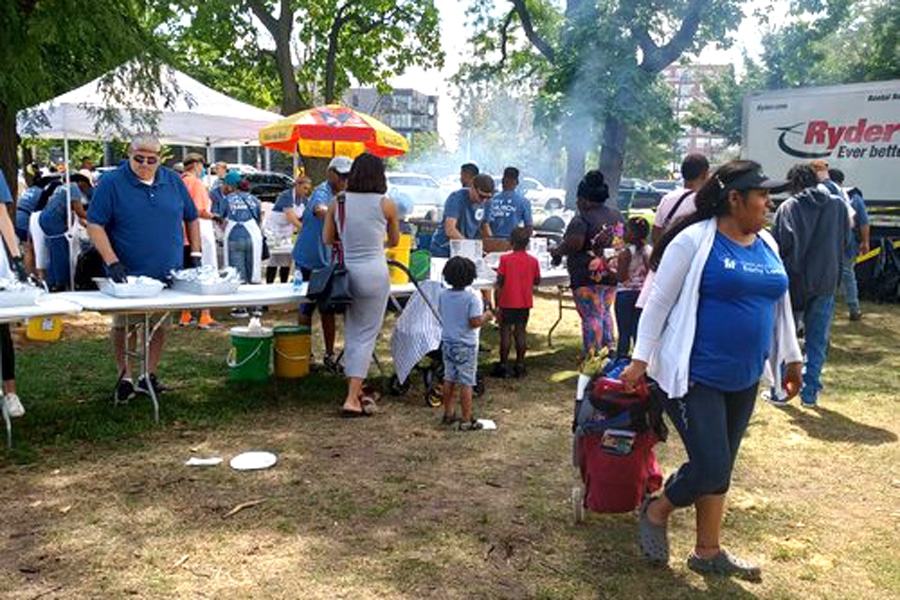
The Safe Cycling project focuses its resources on the South and West Sides of Chicago and aims to partner with community leaders to help distribute helmets. Their first event was at the 27th Ward Community Day on August 27. Juliet found a table at the Community Day by messaging Alderman Walter Burnett, Jr., who she had previously met through her time as a Chicago Peace Fellow.
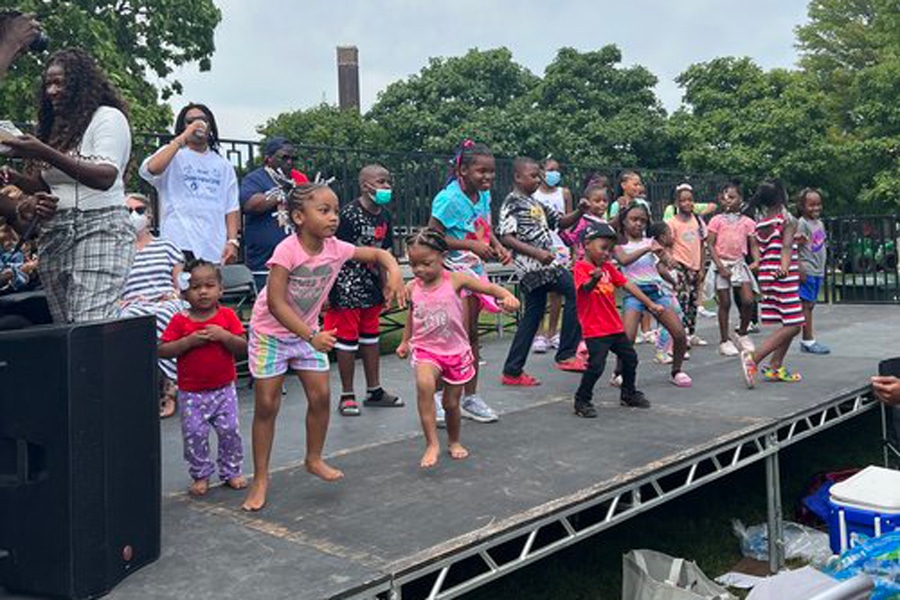
At the Community Day, Juliet was able to hand out 55 helmets:
People were really excited and surprised they could get a helmet for free. Some people were on roller skates, some people were on motor scooters, and they all got helmets.
Juliet also brought other safe cycling activists to the community day by contacting the Chicago Department of Transportation’s SAFE Ambassadors program. Though the SAFE Ambassadors typically work with schools to provide bicycle safety programs, Juliet reached them and discovered they also do other community-based events. Together, both the Safe Cycling project and SAFE Ambassadors made sure everyone at the event interested in receiving a helmet got one. Juliet was ecstatic with their partnership and spoke about how the two tables complemented one another: “When the SAFE Ambassadors didn’t have helmets that fit, they sent people to my table because I bought helmets of all sizes.”
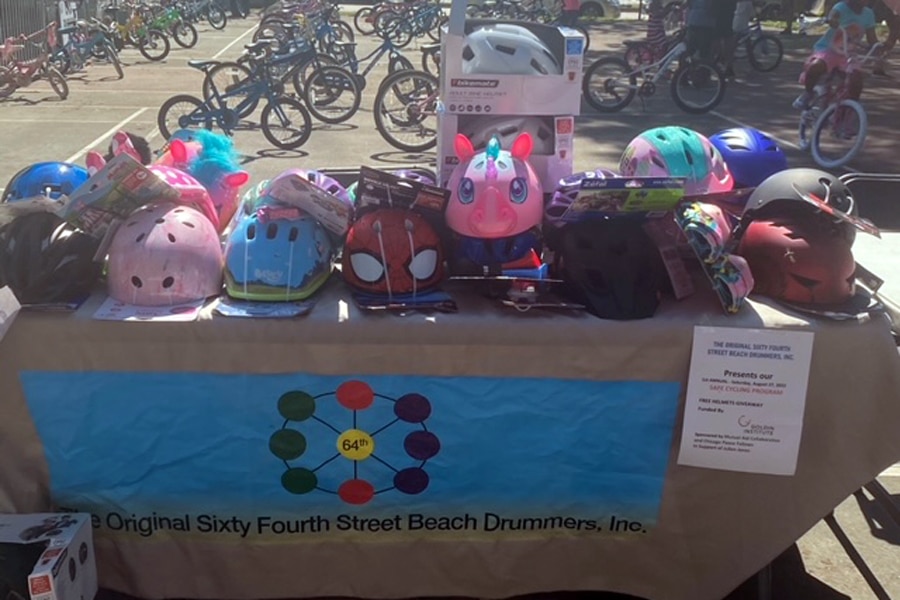
On September 17, the Safe Cycling project partnered with Margaret’s Village to offer helmets to residents of South Chicago. Margaret’s Village is a shelter that provides transitional housing for homeless women, children, and families. Juliet connected with the organization through her work doing HIV education and testing at a social services agency. She spoke with Angela Hicks, Executive Director of Margaret’s Village, and offered for the Safe Cycling program and SAFE Ambassadors to attend their annual Peace Fair. The Peace Fair, a block party that offers violence prevention programming, was an ideal venue to provide bike safety materials and education. When Angela accepted her offer, Juliet organized another table for the Safe Cycling project and gave away 28 helmets and other cycling accessories.
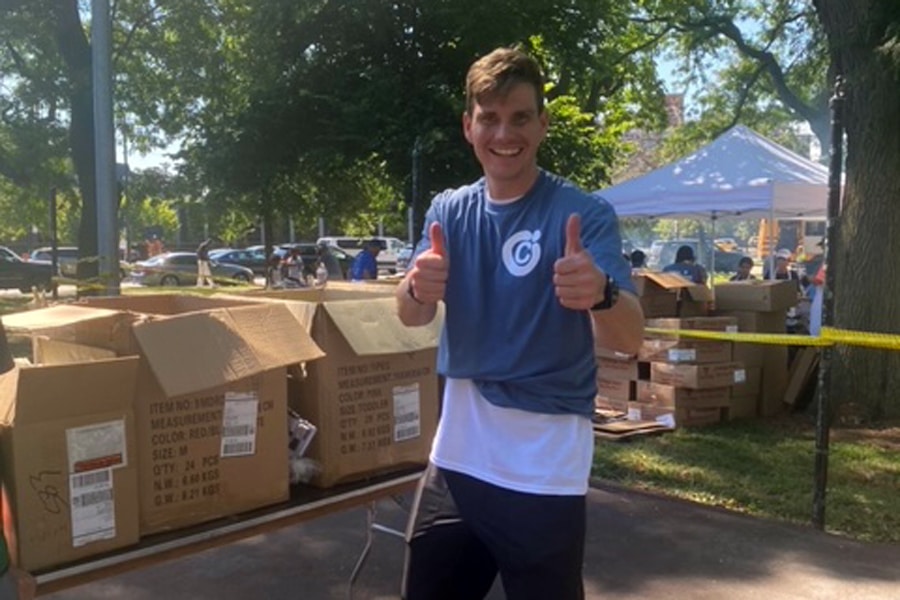
The future of the Safe Cycling project will bring even more collaborations between organizations to distribute helmets in their communities. So far, Juliet has used a range of connections to bring helmets and bike safety instructions to the South and West Sides. She hopes that in the future, she can find even more collaborators and bring more attention to the project. Juliet would like to continue expanding the Safe Cycling project to host an annual event. Through creating grassroots networks with the help of the Mutual Aid Collaborative, the Safe Cycling project has brought needed helmets, bikes, and other resources to people who lacked them. Their work together has played a part in creating safer and healthier communities in Chicago.
Safety Net Launches Blood Drive
By Zeki Salah, Facilitator, Mutual Aid Collaborative
Chicago Peace Fellows are working to address an increased demand for blood from Black and Brown donors through holding a Mutual Aid Collaborative Blood Drive. The Blood Drive is part of an ongoing Safety Net project by the Chicago Peace Fellows Mutual Aid Collaborative, a group of 60 Black and Brown leaders and committed allies who live and work in the communities they serve on the South and West sides. Fellows working on the Safety Net project seek to address multiple pandemics that ail the South and West Sides of Chicago, including COVID-19 and community violence.

The Safety Net campaign is accepting donation pledges until June 28th, but you can donate at any time after making the pledge. You can sign up for the Safety Net team’s blood drive here: https://sleevesup.redcrossblood.org/campaign/give-from-the-heart/
You can also promote the blood drive by using the hashtag: #OurBloodMatters
The Safety Net project started at the height of the COVID-19 pandemic by creating a distributed network of PPE providers throughout a grassroots network, but has since expanded its scope to include broader public health issues. Since its inception, the Safety Net project has also held COVID vaccine clinics to address the disproportionate impact of COVID-19 on Black and Brown communities. The Chicago Peace Fellows Blood Drive is the latest project by the Safety Net team and seeks to address a shortage of Black and Brown blood donors.

More Black and Brown donors are needed in the United States because of a rise in demand for some rare blood types that are more common in people of Black heritage. Certain subtypes of blood need to be matched to treat blood diseases such as sickle cell anemia. Blood donors are screened to see if they might possess certain rare blood types, which can also help match plasma and bone marrow donors. The demand for blood that the Safety Net team seeks to address is expected to increase even more during the summer, due to the increase of accidents such as car crashes and fireworks, as well as spikes in cycles of gun violence. This can put patients who need blood in consistent quantities at risk as these sorts of incidents risk depleting the blood reservoir that their treatments draw from.
The Safety Net wanted to bring attention to the need for a more diverse blood bank after learning that the director of the Chicago Peace Fellows, Burrell Poe, was diagnosed with aplastic anemia. Treatment for aplastic anemia requires bone marrow transplants, which can only be performed if the donor and recipient have matching subtypes of blood. In solidarity with Burrell, the Safety Net team scheduled their Blood Drive around his birthday, so that members of the community could be made aware of the importance of blood donations and their potential to transform the lives of other people.

Jacquelyn Moore of the Safety Net team donated blood in response to the blood drive and found the experience to be fulfilling as an altruistic act, while also gaining new insights into her own health. Jackie was touched by the campaign on a personal level because a blood drive saved her husband’s life after it connected him with a match for a stem cell transplant. She stated “giving blood provides a way to directly help the community and provides people with an opportunity to act, to improve the lives of people around them.” Additionally, Jackie noted the pragmatic benefits donors receive when giving blood. After giving blood, she was contacted by the Red Cross and given a report of her COVID-19 antibodies. She noted that the Red Cross also provides other reports on other aspects of the health of its donors and can act as a free health screening. At the screening, vital signs are checked and problems such as high blood pressure, arrhythmia, or low hemoglobin levels can be detected.
The Safety Net team’s blood drive campaign also seeks to dismiss myths about giving blood. They assert that giving blood is not painful, and can even be relaxing as it gives the donor an opportunity to sit back and take a break from the hustle and bustle of the day. Additionally, the Safety Net encourages members of the LGBTQ+ community to explore the possibility of giving blood, because many of the previous restrictions against donors within this community have been lifted. Lastly, the Safety Net team emphasizes the safety of giving blood, donation centers undergo strict COVID precautions and there is a low risk of contracting COVID while giving blood.
Illuminating the Pathway to Racial Justice in Philanthropy
The Chicago Peace Fellows Mutual Aid Collaborative held a press conference on the anniversary of the assassination of Malcolm X to amplify the themes of their open letter, A Pathway to Anti-Racist Philanthropy. The Mutual Aid Collaborative members are all Alumni of the Chicago Peace Fellows program -- now 60 members strong across the South and West Sides -- who joined forces through the Collaborative as an ongoing platform for shared learning and collaboration.
During this interactive press conference, Collective members La'Keisha Gray-Sewell, David Gonzalez, Cosette Nazon-Wilburn, Victoria Brady, Gloria Smith and Annamaria Leon shared the core elements of the Funders Pledge, outlining critical steps that philanthropic leaders can take immediately to promote racial justice in funding.
Chicago Peace Fellows Mutual Aid Collaborative was born in 2020 to address the enduring legacy of racial injustice that has been laid bare by the disproportionate impact of the twin pandemics of violence and COVID-19 on our communities on the South and West sides of Chicago.
During the press conference, Fellows shared insights into how their Mutual Aid Collaborative can be an illustrative model for philanthropy to consider on their path to racial justice in funding. In particilar, the Collaborative uses a "pooled fund" approach where those closest to the issues make collective decisions, share their gifts and assets, and take collective action on priorities that are set by the communities they serve.
This powerful call for Racial Justice was echoed in an article in the Chicago Sun Times entitled Chicago philanthropies urged to sign pledge to ‘rectify racial inequity’ in their giving, featured in a news report on WBBM NewsRadio, and published as an op-ed in Crain's Chicago Business.
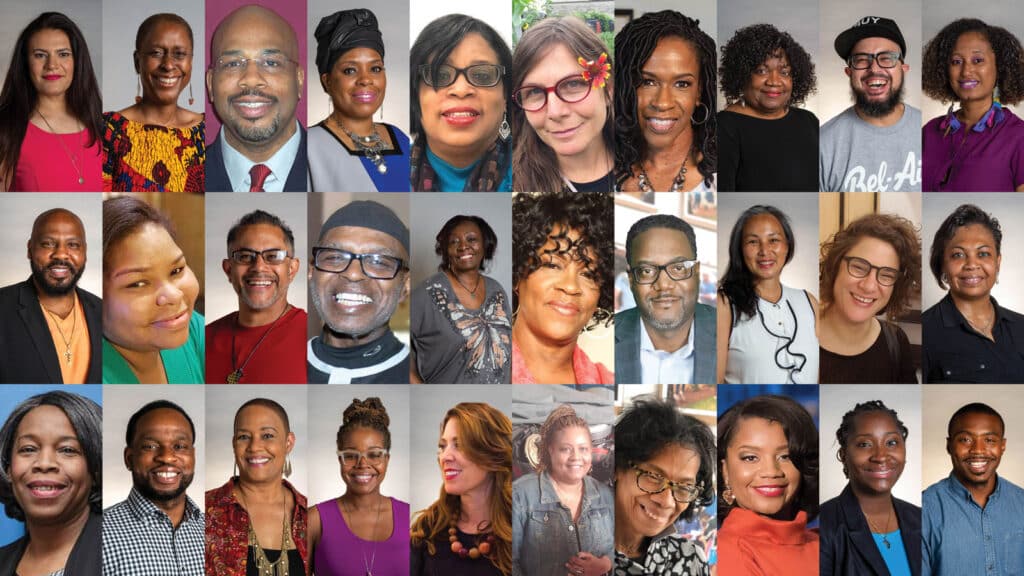
All Foundations, corporations, donors or aligned organizations that are willing to pledge to stand up for racial equity are invited to connect by completing this short form:
CONNECT WITH US
If you have questions or suggestions, please connect with us at funderspledge@goldininstitute.org or at (312) 951-1691.
Crime Stoppers Microgrant Awarded to StickTalk
By Cree Noble, Team Coordinator
Last summer, our 22 Chicago Peace Fellows collaboratively designed and supported a wide range of peace building projects using a dedicated pooled fund for violence prevention. When creating projects, Annette Kelly noticed many of these projects dealt with youth, health, and well-being, but not with crime prevention directly. During the summer, she voiced her idea about having a project called Crime Stoppers that would address the violence in Chicago by directly engaging with those most likely to be a perpetrator or victim of crime.
Annette’s idea was well received by many fellows, but Dorothy Thompson and Tia Brown really stepped up and helped Annette with the formation and execution of this plan. The Crime Stoppers team met biweekly to figure out what was the best course of action. A few ideas about violence prevention were brainstormed such as hosting workshops around the topic, but after weeks of discussion, the team decided they wanted to give out a microgrant to a nonprofit who was already working with violence prevention.
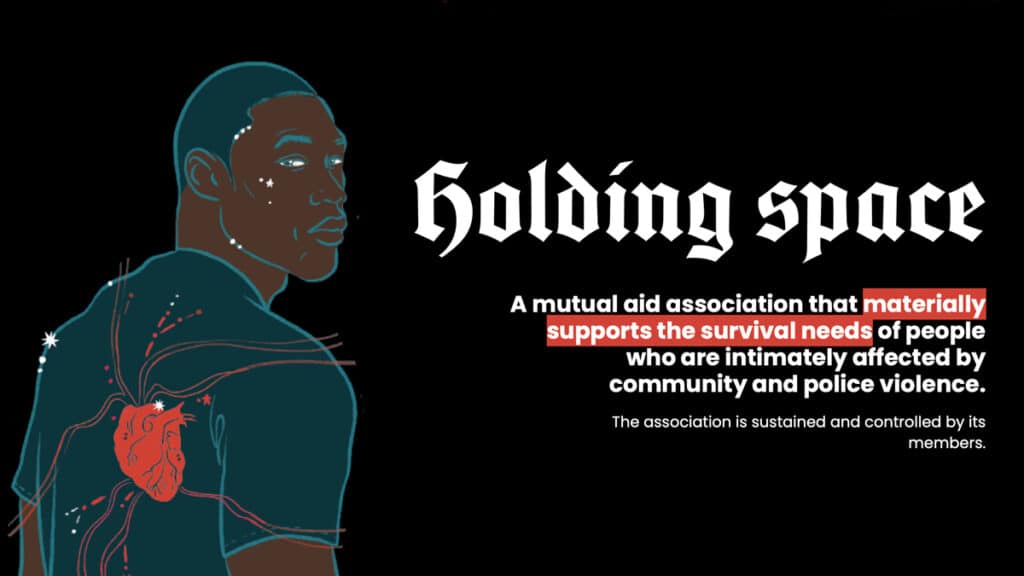
The application process was detailed and strategic in order to find the best candidate for this microgrant. Annette states, “we wanted to cast our nets wide” and wanted to look for an organization without all the “bells and whistles.” The microgrant was for $2,000 and 36 organizations applied. For the selection of the microgrant, Annette, Tia, and Dorothy came up with a rubric to follow as well as a scoring system. They ranked each group according to their mission statement, the population they served, and what they planned to do with the money.
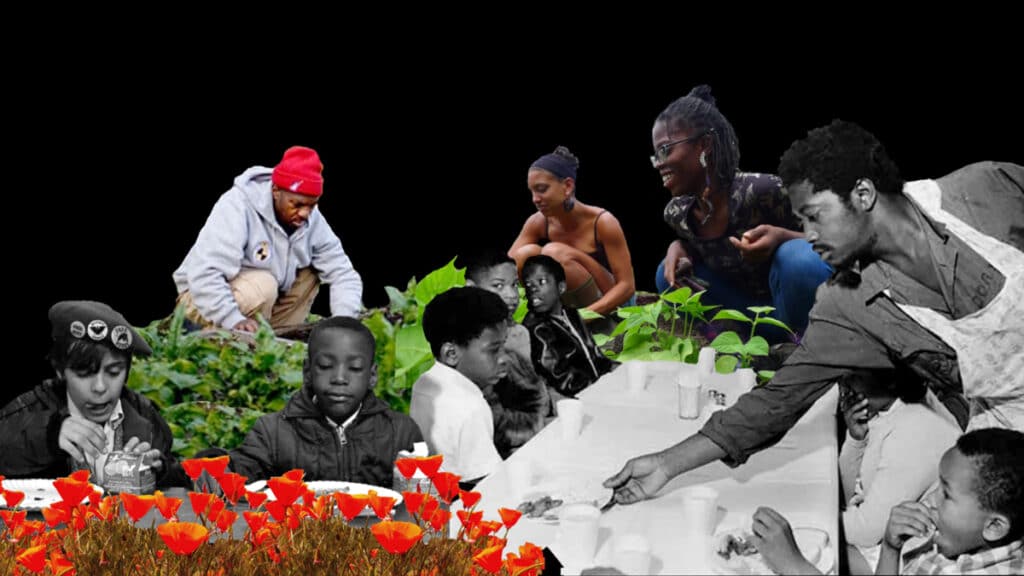
After weeks of going through each application, the organization Stick Talk was the recipient of the microgrant. According to Stick Talk’s website, “We reassess urban gun violence through the prisms of harm reduction and mutual aid. Our intention: to reduce the number of young Black people who are living at the edge of fatality, and to interrupt the demonization and criminalization of their politics of survival.” Tia says, “Stick Talk was the perfect organization for what we were looking for in a winner.”
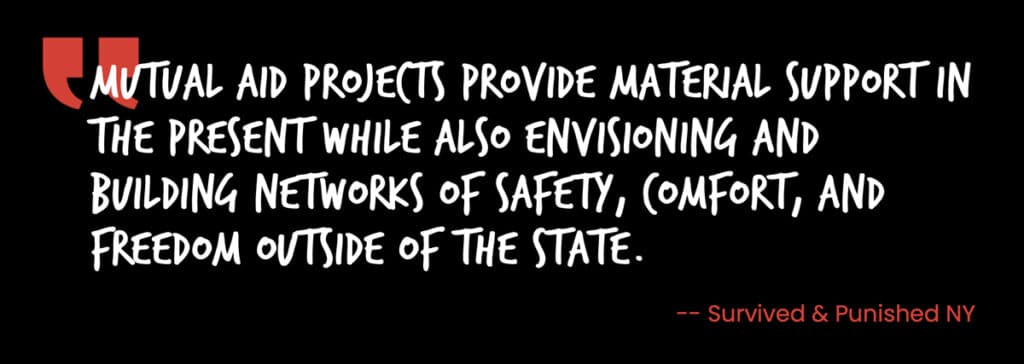
Crime Stoppers looks forward to seeing the grant be put in use at Stick Talk. They are also hoping to use extra funds they have to help families who have been impacted by violence.
Dear White Funders: I Can't Breathe Either
by Frank Latin, 2019 Chicago Peace Fellow
My name is Frank Latin and first and foremost I’m a black man. I am also the founding Executive Director of Westside Media Project, a small non-profit organization on Chicago’s West side that works to provide exposure to students (and now adults) in media/technology related fields.
I’ve been wanting to get this off my chest for a few years. Now, with the unfortunate murder of George Floyd and the ensuing worldwide protests, which have led to ongoing discussions around the topic of systemic racism, I feel this is the perfect time.
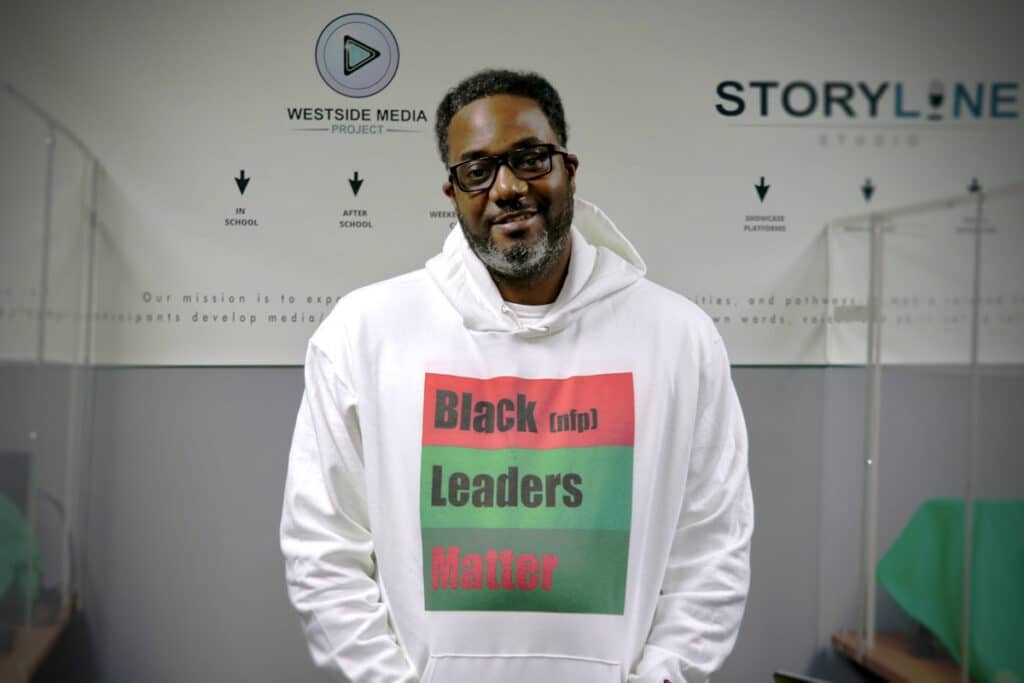
What I’ve learned in 14 years of running a non-profit is that philanthropy is one of the most racist sectors of society, competing neck and neck with the criminal justice, education and the health care systems in America. In fact, my view is that philanthropy works to bolster and prop up those other sectors by reinforcing the status quo. It is based on white society’s ‘Savior complex’ and supports white leaders at all costs, even those doing work in black and brown communities.
The perceptions I had of an uneven playing field used to upset me and have me somewhat disgruntled. However, I came to realize my perceptions were reality and have been substantiated in multiple studies, the latest published in December of 2019 by the Bridgespan Group, titled ‘Disparities in Funding for Leaders of Color Leave Impact on the Table.’
Philanthropy assumes that black and brown people living in distressed communities are part of the problem rather than part of the solution. I come to realize that as a professional, educated black man, I simply do not fit within the current model of philanthropy, primarily because I look like, walk like and talk like the residents on the west side of Chicago. The notion of a black man doing positive work in a black community without a white brain-trust or network to validate the organization is not enticing to funders. I lack what I term “white insurance” to make funders feel comfortable that their support is safe.
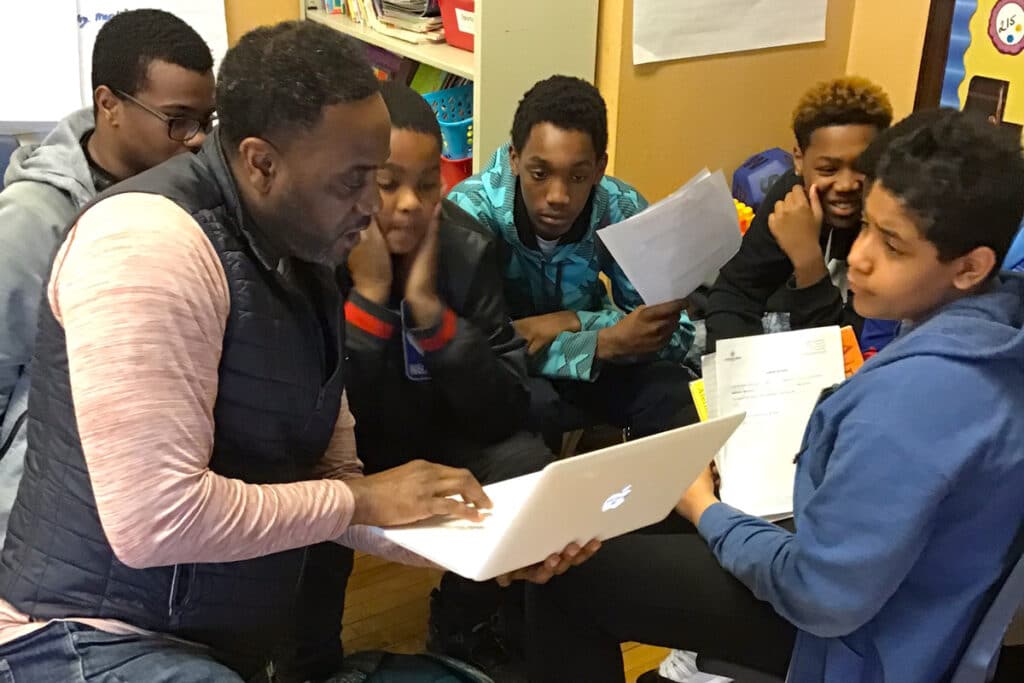
I’ll admit, when I started the organization back in 2006 I had little to no knowledge of how philanthropy worked. What I did have was a bachelor’s and a master’s degree in economics with years of experience working at a government agency so I was more than capable of learning the ropes. I decided to begin a volunteer project that eventually became something much bigger; but which I still do voluntarily.
Chicago is home to a vibrant philanthropic community and they support issues and causes not only here in the city but around the globe. However, here in the city they seldom support organizations led by leaders of color working to address those very issues, and in those instances when they do, it will rarely, if ever be at the same level shown for white led organizations doing similar work.
This has directly led to a tiered, apartheid-like structure within non-profits in Chicago where there is a huge gulf between white led organizations and those headed by leaders of color. It also perpetuates ‘culture vultures’ who seek advancement, profit and notoriety off both the misery of black and brown people as well as the structural racism that exist within philanthropy. It also encourages phony alliances in which whites who yield privilege and influence utilize people of color as fronts or tokens to gain inroads into certain communities.
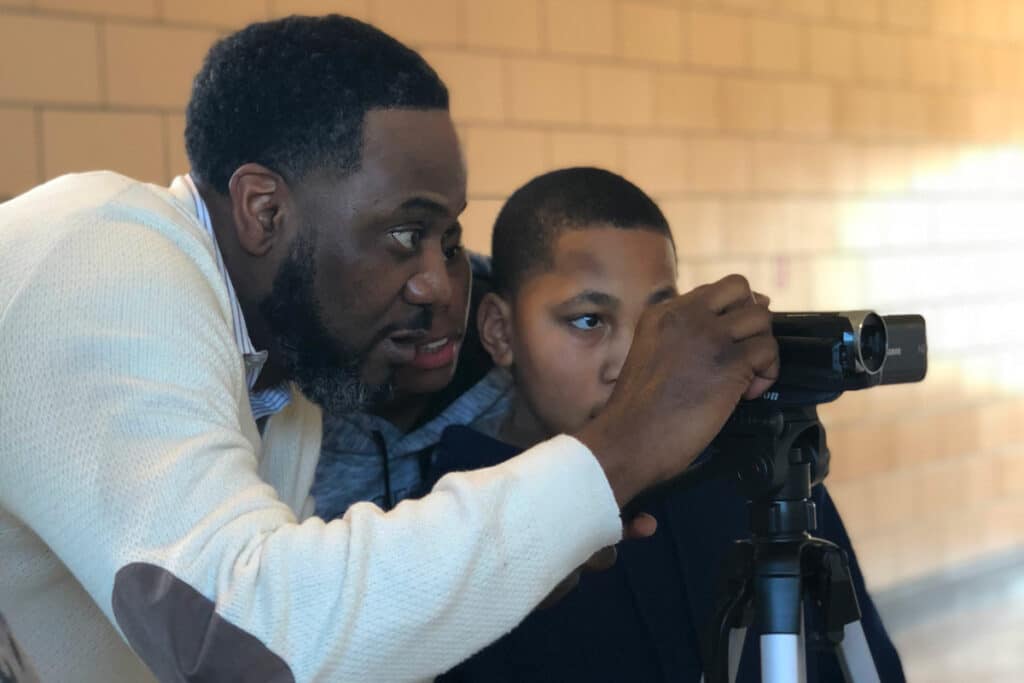
The Covid-19 pandemic has put a spotlight on the health disparities that have always existed in America. Police misconduct has been thrust back into the headlines again, and rightfully so.
Philanthropy on the other hand, is a sector that often goes unnoticed and its racist policies and practices never get splashed across the evening news or social media posts. However, the lack of funding provided to leaders of color added with the desire to prop up white leaders to do work in minority communities has devastating effects. At times, it works like a sniper, taking would-be leaders right out the field. Other times it provides a slow death, reminiscent of a choke hold or a knee to the neck not allowing organizations ran by leaders of color to service our communities.
To the philanthropic community of Chicago...I CAN’T BREATHE!!
Learn more about Chicago Peace Fellow Frank Latin's work at WestsideMediaProject.org.
Support the Mutual Aid Collaborative
